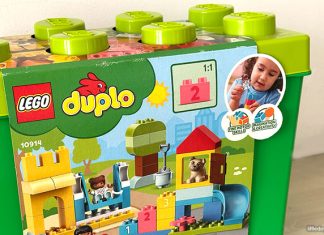
Let your little ones express their imagination and artistic flair in the Reach for Great Colouring Contest 2025, an exciting contest designed just for them.
Held in celebration of Great Eastern Life’s 117th Anniversary, the Reach for Great Colouring Contest 2025 is a vibrant platform for young artists aged 3 to 6 to shine through colours and creativity!
Great Eastern’s Reach for Great Colouring Contest

The Reach for Great Colouring Contest 2025 is taking place from 26 August to 16 November.
MID AUTUMN FESTIVAL: Lanterns, Lights and Festive Fun
GIVEAWAY FOR ENEWSLETTER SUBSCRIBERS: LEGO DUPLO Deluxe Brick Box
There are two contest categories:
- Category A (3 – 4 years old)
- Category B (5 – 6 years old)
Over $10,000 worth of prizes await the Top 10 winners in each category.
Here’s a sample of the Top 3 prizes for each category.
| Placement | Prizes (Category A: Age 3 – 4 years old) |
| 1st | S$1,500 Popular Gift Vouchers + Micro Mini Deluxe Magic LED worth S$149 + gift bundle* worth more than S$298! |
| 2nd | S$800 Popular Gift Vouchers + gift bundle* worth more than S$298! |
| 3rd | S$500 Popular Gift Vouchers + gift bundle* worth more than S$298! |
| Placement | Prizes (Category B: Age 5 – 6 years old) |
| 1st | S$1,500 Popular Gift Vouchers + Micro Junior Luggage Scooter worth S$249 + gift bundle* worth more than S$298! |
| 2nd | S$800 Popular Gift Vouchers + gift bundle* worth more than S$298! |
| 3rd | S$500 Popular Gift Vouchers + gift bundle* worth more than S$298! |
View the full list of prizes that stand to be won here.
Join the Great Eastern Reach for Great Colouring Contest
Take part in the Reach for Great Colouring Contest and let your child’s creativity shine through. To join:
- Download the contest form.
- Draw and colour/complete the picture.
- Complete the slogan: “What does Reach for Great mean to you?”
- Submit the contest form and your child’s art masterpiece here!
Contest dates: 26 August 2025 to 16 November 2025 (dates inclusive).
Get more details about
Great Eastern’s Reach for Great Colouring Contest 2025
*Gift bundle contents:
- Yeo’s gift bundle worth S$175
- VITAGEN Less Sugar gift bundle worth S$60
- Ee Sin Lazada store voucher worth S$20
- Le Petit Society pencil case worth S$28
- Swensen’s kids meal worth S$13.07
- Winner’s Certificate

















